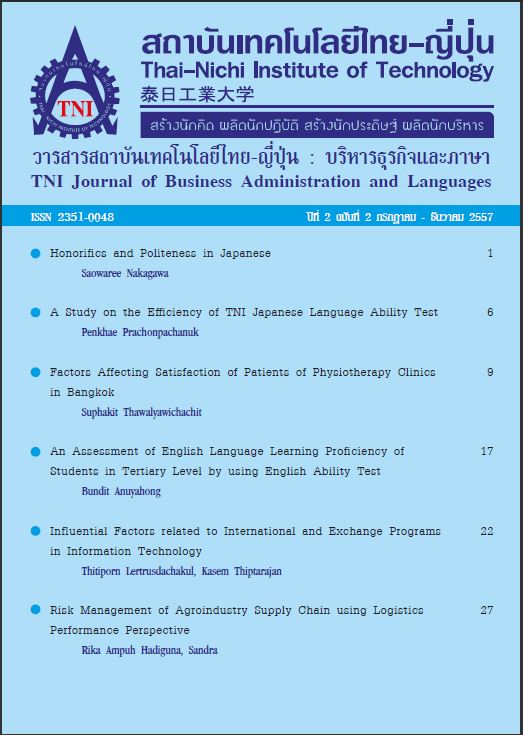Raising Students’ Awareness Toward Environmental Issues: Will There be Any Impact on Their Purchasing Behaviors?
Main Article Content
Abstract
This experimental research was conducted to test whether there was any change in students’ environmental knowledge, attitudes, and behaviors following a brief text and video presentation on environmental issues. Thirty students of International Business Management program of a private university in Indonesia, who claimed to have little or no interest in environmental problems, were selected to be the subjects of this research. The results showed that there were indeed some significant changes in subjects’ environmental knowledge (t= -6.599, p=0.000 and t = -4.722, p= 0.000) and attitudes (t = -4.748, p=0.000) before and after following the presentation. However, the result also showed that subjects only interested in switching their choice of brands into the ones that claim to be more environmental-friendly (t = -3.003, p= 0.005) instead of paying higher prices to buy environmental-friendly products or changing their purchasing behaviors after following the presentation. In short, this research showed that even apathy people can be educated about environmental issues and be induced to change their choice of brands into the more environmental-friendly ones. This situation will definitely bring hope not just to the producers of environmentally-friendly products but also to all human beings.
Article Details
Article Accepting Policy
The editorial board of Thai-Nichi Institute of Technology is pleased to receive articles from lecturers and experts in the fields of business administration, languages, engineering and technology written in Thai or English. The academic work submitted for publication must not be published in any other publication before and must not be under consideration of other journal submissions. Therefore, those interested in participating in the dissemination of work and knowledge can submit their article to the editorial board for further submission to the screening committee to consider publishing in the journal. The articles that can be published include solely research articles. Interested persons can prepare their articles by reviewing recommendations for article authors.
Copyright infringement is solely the responsibility of the author(s) of the article. Articles that have been published must be screened and reviewed for quality from qualified experts approved by the editorial board.
The text that appears within each article published in this research journal is a personal opinion of each author, nothing related to Thai-Nichi Institute of Technology, and other faculty members in the institution in any way. Responsibilities and accuracy for the content of each article are owned by each author. If there is any mistake, each author will be responsible for his/her own article(s).
The editorial board reserves the right not to bring any content, views or comments of articles in the Journal of Thai-Nichi Institute of Technology to publish before receiving permission from the authorized author(s) in writing. The published work is the copyright of the Journal of Thai-Nichi Institute of Technology.
References
D.B. Budak, F. Budak, Z. Zaimoglu, S. Kekeç, and M.Y. Sucu. (2005). Behaviour and Attitudes of Students Towards Environmental Issues at Faculty of Agriculture, Turkey. Journal of Applied Science, 5 (7), 1224-1227.
M. Füle and A. Kené. Investigation of Consumer Environmental Awareness by Marketing Research Method – Methodological Consideration [online]. Available: https://www.pp.bme.hu/so/article/download/1647/965
R.Y.K. Chan. (1998). Environmental Attitudes and Behaviors of Consumers in China: Survey Findings and Implications. Journal of International Consumer Marketing, 11 (4), 25-52.
I. Azjen and M. Fishbein. (1980). Understanding Attitudes and Predicting Social Behavior. Englewood Cliffs. New Jersey: Prentice-Hall.
L. Festinger. (1957). Theory of Cognitive Dissonance. California: Stanford University Press.
C.A. Dickerson, R. Aronson, and D. Miller. (1992). Using Cognitive Dissonance to Encourage Water Conservation. Journal of Applied Social Psychology, 11, 841-854.
P. Dubey. Changes in Consumer Decision Making Process Led by Environment Information [online]. Available: https://dspace.iimk.ac.in/bitstream/2259/319/1/665-671.pdf
B. Gülgün, S. Önder, E. Aktas, and F. Unal Ankaya. (2008). Responses of University Students to Environmental Problems: A Case Study of Ege University (Izmir – Turkey). Journal of International Enviromnetal Application and Science, 3(4), 234-246.
S. Mokhlis. (2009). An Investigation of Consumer Decision-Making Styles. International Journal of Business and Management, 4 (4), pp. 140-148.
J. Warwick and P. Mansfield. (2000). Credit Card Consumers: College Students’ Knowledge and Attitudes. Journal of Consumer Marketing, 17 (7), 617-626.
https://www.youtube.com/watch?v=IhNInIqu2hM
Z.M. Szerényi, A. Zsóka, and A. Széchy. Environmental Education and Pro-Environmental Behaviour: Results of a University Survey [online]. Available: https://gin.confex.com/gin/2009/webprogram/.../Zsoka_Szechy_Szerenyi.pdf
K.D. Arbuthnott. (2009). Education for Sustainable Development beyond Attitude Change. International Journal of Sustainability in Higher Education, 10 (2), pp. 152-163.
D. Shaw. Education and Sustainable Development. OECD Forum, 3-4 June 2008, Paris.
A. Gore. How Dare We be Optimistic. TED Conference, 1 March 2008, California.


